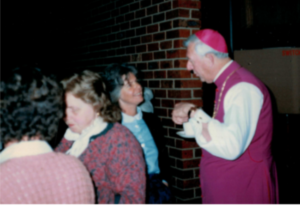As an intelligent Catholic girl from a poor family, when I was 17, I began studies at the University of Melbourne, the first girl in the district to go to university, and one of only 2% of tradesmen’s daughters who went to university in those days.
One of my first year subjects was Philosophy A, taught by Dr Eric D’Arcy who went on to chair the Philosophy Dept at MU. At that time, Dr D’Arcy was also Fr D’Arcy, parish priest of Parkville, whose church career saw him become Bishop of Sale and then Archbishop of Hobart.
The text for Philosophy A was Plato’s Republic. I loved the program, and my teacher brought such clarity to Plato’s Socratic investigations that I experienced an opening of the intellect. Issues such as justice, goodness, reality itself… these were for consideration without doctrine or dogma. My mind began some serious contemplation, and a glimmer of light fell on the way my mind had been formed in a rather one-sided way by my religious upbringing. Because he was so illuminating in encouraging open-minded enquiry into profound issues, I took one of his topics in a later year, too. The fact that I majored and then did some further study in Philosophy was partly influenced by his teaching.
Years later, when I had established a meditation practice but then moved to the country, I sent my children to a Catholic school, so that they might have a benchmark for making their own decisions later in life. Nothing so dogmatic as what I experienced, just an environment that purportedly espoused love as the foundation of living well. Then came time for their Confirmation… and along came Bishop D’Arcy of the Diocese of Sale to do the confirmations.
It was not the first time I had heard him preach – I guess I went to the Parkville church from time to time. And he had appeared occasionally at Newman Society camps. At the time of the confirmation, though, I must have been aged about 4o, and certainly some maturing had happened since I was the wide-eyed teenager considering The Republic as expounded by him.
This experience was disheartening, though. From those early investigations stimulated by first year philosophy, thanks to Eric D’Arcy, my inner life had developed considerably, and was further broadened by meditation. But his seemed to have shrunk. The man before me was a religious duffer whose way of maintaining his Catholic faith had been to separate intellect from belief. And it did not matter how narrow or absurd those beliefs were, he stuck to them, even though his insight must have said, please don’t do this.
In fact I have a vague memory of him saying something along those lines, that faith was superior to intellect, perhaps at a Newman Society camp – that if there were a dichotomy between faith and intellect, a Catholic had a duty to stick to faith. That is, never question the superstitions, corruption, or obvious non-sequiturs of faith, or the egocentric or cultural biases of religion… just close off the mind and maintain a weird sense that doing so is heroic.
As it happens, I never read The Republic at university. I swanned through the exams because he was such a good teacher that my mind considered the material in absorbing detail, so that writing for the exam was a pleasure.
In the picture above, Bishop D’Arcy is asking me how I enjoyed The Republic. I didn’t have the heart to tell him I hadn’t read it.

